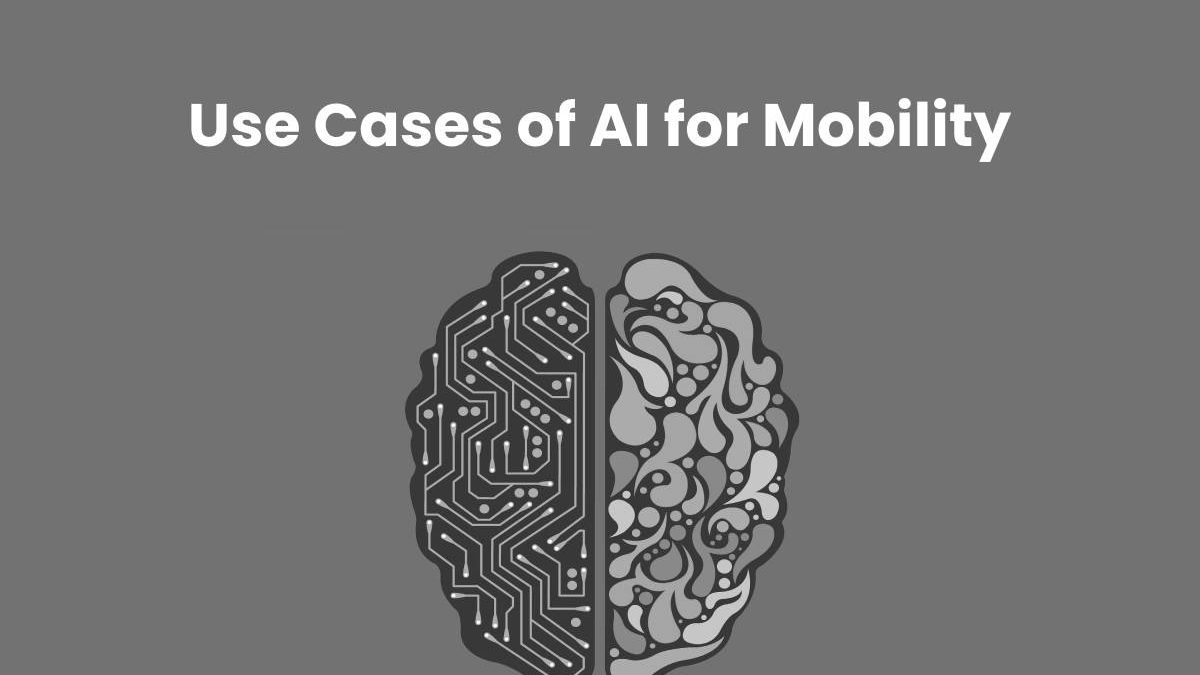Use Cases of AI for Mobility
Mobility can be seen to shift rapidly towards becoming environment- friendly. Smart automated, connected vehicles are the need of the hour and manufacturers have to create ways to meet the requirements. Vehicles of the future that are connected, autonomous and electric or hybrid need cutting edge technology to manufacture. The concepts of shared mobility are becoming an important part of co-creating smart cities. At the heart of all change in the mobility arena is the use of advanced and efficient electronic devices. Technology such as Robotics, Big Data, 3D printing, Artificial Intelligence (AI) are all supporting innovation in the mobility sector. AI in particular finds several uses in smart manufacturing, passenger transport, logistics and connected services. In this article, the role of AI and its multiple uses for mobility are explored.
Smart manufacturing
AI is largely known for enabling self-driven vehicles and greater safety measures through the use of scanners and sensors. AI is being used in manufacturing for the automotive industry as follows:
-
Predictive maintenance
Predictive maintenance is highly valued in the automotive industry. Data is continuously collected and analysed with the help of sensors to forecast maintenance requirements. Predictive maintenance also enhances the security of the manufacturing unit. It plays a key role in ensuring that there is no down-time, thereby preventing losses. There are other advantages such as monitoring equipment on the floor and monitoring conditions of assets.
-
Use of Robots
Robots can perform repetitive tasks with same quality throughout without tiring. This makes them ideal for assembling vehicles and prevents error and any variance. It also helps to protect workers from the hazards of manufacturing industry such as pouring metal in foundries, exposure to welding, or lifting heavy parts which might cause musculo-skeletal disorders. By taking over multiple tasks robots can address the challenges of capacity in the manufacturing industry.
-
Automated Quality Testing
AI plays an important role in quality testing of new-age vehicles. Safety assessment and autonomous driving tests are an important part of the quality testing process. Augmented reality (AR) is used for testing automated and connected vehicles. A simulation platform that can mimic the real world testing facility like surrounding vehicles and traffic signals is used for this purpose.
-
Moving materials
Materials need to be moved around an automotive plant and it can now be done without human intervention. This is made possible with the use of Automated Guided Vehicles (AGVs). AGVs are used for movement of materials and are capable of detecting obstacles in their path and avoiding them.
-
Mobility of passengers
Mobility of passengers is of prime importance globally. AI supports the development of autonomous vehicles for a clean and green environment. They will also ease the stress of navigating through the traffic. Shared services especially in urban areas are predicted to become the norm to beat the traffic congestions.
-
Autonomous vehicles
According to business reports, the global autonomous vehicle market is projected to reach $556.67 billion by 2026, registering a CAGR of 39.47% from 2019 to 2026. Autonomous vehicles are designed to operate without a human operator. They use AI software for detection of light and sensing technology to create a 3D map of their surroundings. A combination of software tools are then used to navigate traffic.
-
Assisted Driving systems
Driver assist systems can be used to ensure safety on the roads. They can detect and send a warning about a driver’s drowsiness, they can support by adjusting the speed based on the traffic conditions, steering, and parking the vehicle. The system is able to detect dangerous situations and take control of the driving and the brakes in emergency situations.
-
Logistics
Autonomous vehicles, remote controlled vehicles and drones all form an important part of the mobility ecosystem to deliver cargo across regions. AI has been used to enhance and ensure effective last-mile delivery to meet customer demands. Here are some of the other use cases of AI in logistics.
-
Drone delivery
Drones can be deployed to deliver goods in urban areas without challenges of delay due to traffic. They can also be used to deliver in geographically remote areas. For example, drone-based delivery system has been recently used during the Covid 19 pandemic to deliver vaccines.
-
Autonomous trucks
Trucks that can deliver goods across a region while navigating highways autonomously have several benefits. With the help of neural networks, optimal delivery routes can be chalked out saving time and costs, and reducing CO2 emissions. A convoy of inter-connected trucks, that can communicate with each other and use sensors to detect their surroundings could ensure road safety.
-
Remote controlled ships
Cargo ships that are monitored and controlled remotely from a off-shore station will reduce the need to have crew on these ships.
With the changing scenario in the mobility sector, AI will remain key enabler in other areas such as R&D, mobility services, and customer experience.
Related posts
Sidebar
Recent Posts
The Rise of Legal Tech Startups: What Law Firms Need to Know
Introduction The legal profession, often rooted in tradition and resistant to change, faces a technological revolution. Legal tech startups are…
Shiba Inu vs. Dogecoin: The Battle of the Meme Coins
In the realm of cryptocurrency, there has been an ongoing battle between two popular meme coins, Shiba Inu and Dogecoin….




Review Use Cases of AI for Mobility.